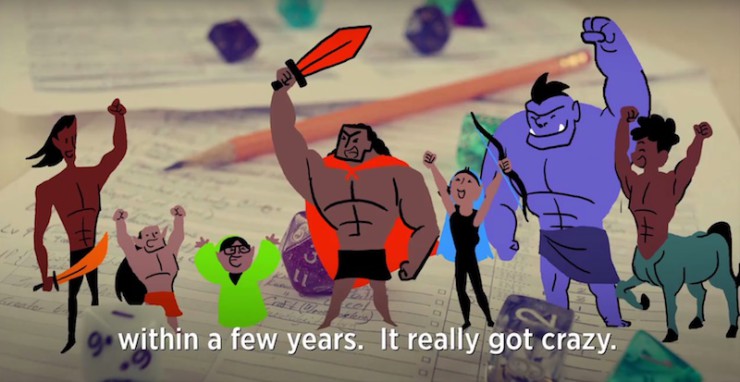It’s baffling to us now, but in the early 1980s many adult minds genuinely considered Dungeons and Dragons to be “satanic”. The game, with its dice and little figurines and complex rules (so basically Monopoly with critters?) was seen as an introduction to demonology, and was blamed for teen suicides and murders.
The New York Times recently took a look at this moment of panic, and confirmed that the only real result of a childhood spent playing D&D was: a life spent in creative industries. Authors Junot Diaz and Cory Doctorow talked to the paper about how Dungeons & Dragons set the course of their lives.
“They went down the storm tunnels! And got to play D&D in the tunnels! We had to sit around a table. How awesome would it have been if it turned out D&D was like what they did.” Cory Doctorow may react snarkily to the 1982 film Mazes and Monsters, but the people who led a witchhunt against D&D were all too serious. As New York Times documentary RetroReport explains, conservative Christian groups warned parents that the game would lead their children to Satan, while the media tried to blame tragedies like the suicide of James Dallas Egbert on his love for the game, rather than looking more deeply into his life.
In a more serious moment, Doctorow, who is featured in one of the early-80’s gaming profiles, credits his love for the game with learning how to argue with adults. You can watch the whole video below–it’s a fascinating look at the era:
William Dear, the man who investigated Egbert’s initial (non-D&D-related) disappearance, published a book about the case; Rona Jaffee wrote a novel based on the rumors about the case, which then became the basis for the film Mazes and Monsters; and a group called “Bothered About Dungeons and Dragons” formed in 1982 in response to a different teen suicide. This “moral panic” drew so much more attention to D&D that it actually added to its success. As Timothy Kask, one of the developers of D&D, notes in the NYT video, sales of D&D manuals only really took off in the wake of the Egbert case, nearly quadrupling sales of the game manuals. Gary Gygax and his partners went from earning 2.3 million dollars in 1979, to 8.7 million by the end of 1980.
Of course, what’s most interesting is that when the NYT’s retrospective cuts to the present day, it’s video games that are being vilified by some parents and the media at large, while D&D is seen as a healthier, more cooperative alternative. The video ends with a celebration of people like Doctorow, Diaz, and Stephen Colbert, who have gone on to channel the creativity they sharpened in D&D games into their own writing.
Author Junot Diaz has the warmest memories of the game, in stark contrast to the documentary’s clips of moral panic. As a young Dominican immigrant in New Jersey, he collected a diverse group of friends who gathered together to play. He usually hosted the games, and since his mother was happy that gaming was keeping her son off the street, she’d cook for the whole group while they played. “All these kids I grew up with, I think they ate more Dominican food than they ate their own darn food.” By going to different world with the games, Diaz muses that he may have been reenacting his immigration, except this time as the Dungeon Master he was in control of his journey.
But probably the most important part of the reminiscence is Diaz’ realization of what the game offered him and his friends: “Being a bunch of kids of color, in a society that tells us we’re nothing…to be able to play heroes…this was a revolution. None of us had been asked to be protagonists of anything….it was profoundly transformative for us.” You can watch his film below:










